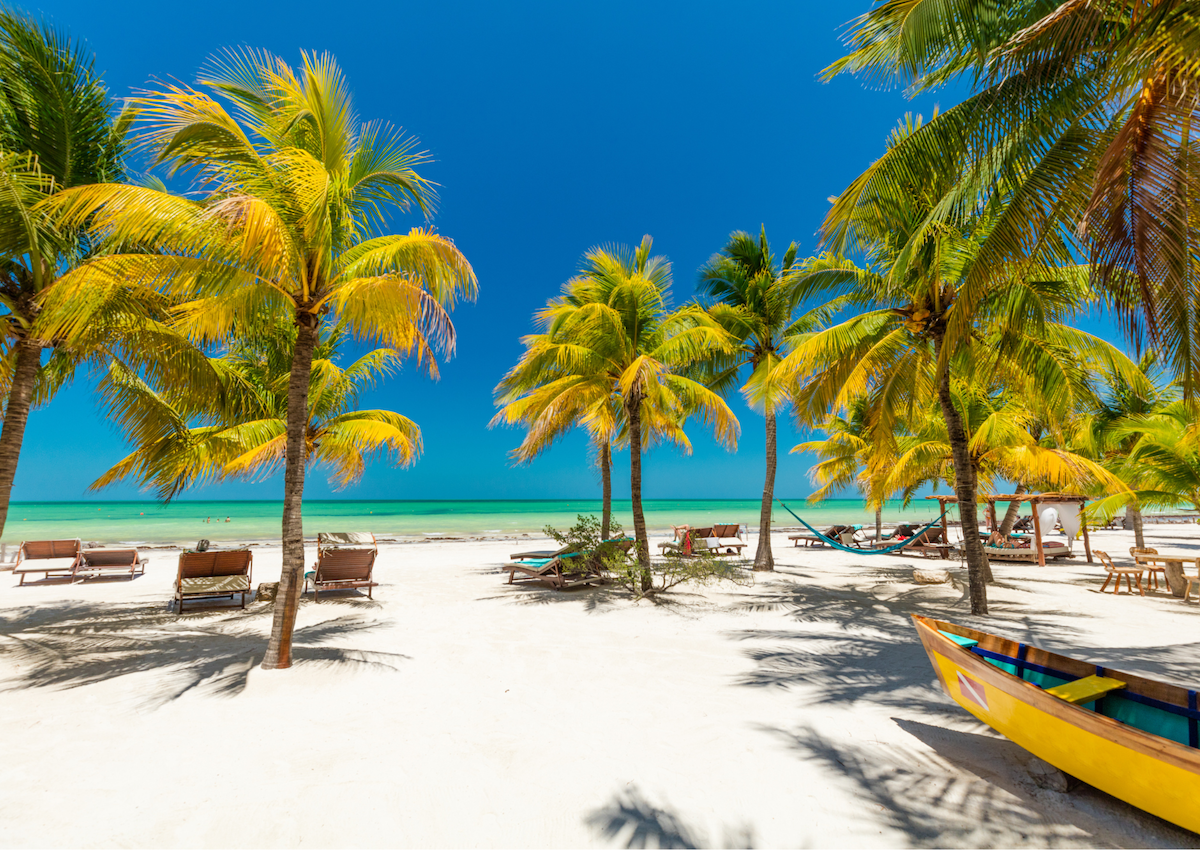
Winter in Mexico: 17 Outstanding Destinations for Holiday Getaways
If you’re looking for the best place to spend winter in Mexico, you’re in the right place! This article spotlights 15 amazing Mexico destinations that are perfect for holiday getaways.
Beelining it south of the border is a brilliant idea any time of year. But winter in Mexico comes with some extra special perks. Excellent weather. Delicious seasonal dishes. Rich cultural traditions. Migratory miracles of Mother Nature. And absolutely fabulous holiday fiestas and events!
As you might have guessed, winter in Mexico is the perfect time to visit the country’s famously beautiful beaches. Along the Riviera Maya and Yucatan Peninsula, the beaches sparkle with sun-kissed weather, zero sargassum and the year’s driest weather. Wintering on Mexico’s sparkling Pacific Coast is all about water sports and whale watching on deliciously warm days.
Inland destinations like Mexico City, Puebla and San Miguel de Allende promise pleasant winter weather, along with loads of lively holiday celebrations. And if you’re hoping for a white Christmas in Mexico, you’ll find it deep in the breathtaking Sierra Madre Mountains.
Read to winter in Mexico? Let’s go!
TABLE OF CONTENTS
Winter in Mexico Beach Destinations
Cancún
Average winter temperature
☀️ 70° – 85° F | 21 – 29° C
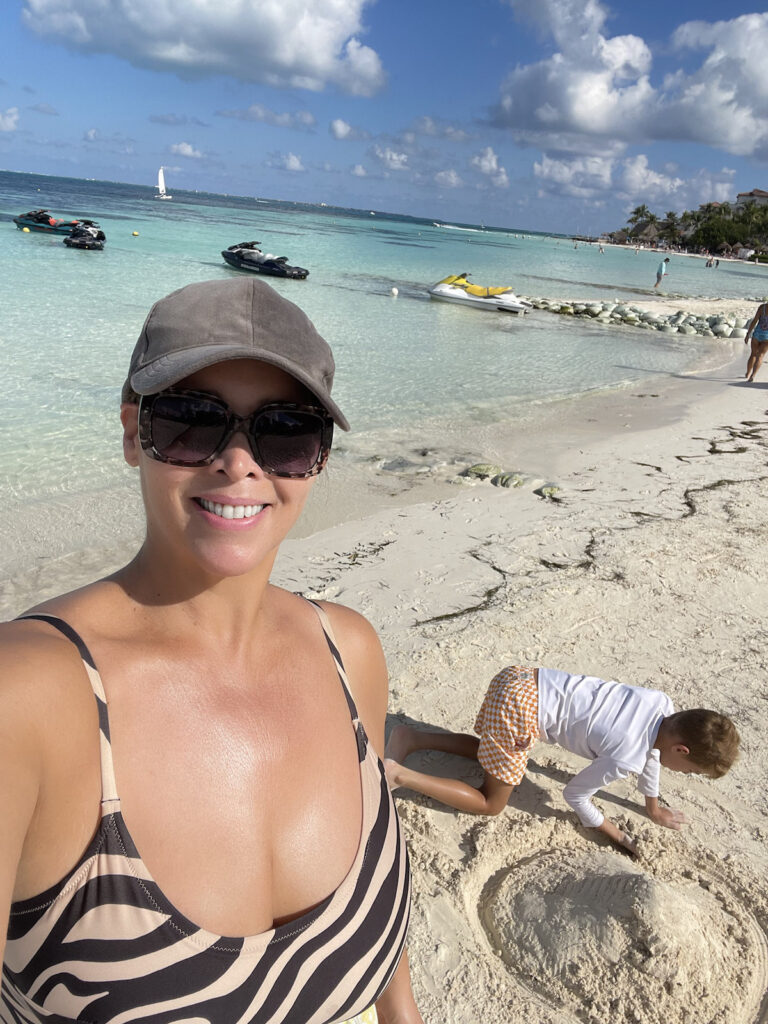
I spent 3 lovely but frosty weeks in Paris last winter. When I returned home to Mexico, I thawed off in Cancún for a week.
As you can see in the photo above… Best. Decision. Ever.
Cancún’s stunning, white sand beaches are at their best during winter. Caribbean Sea temperatures are heavenly, and you won’t spot a spec of sargassum. You can beachcomb, laze in the sun and play in the water ‘til your heart’s content. Which is precisely why the winter months are Cancun’s high season. So if you don’t mind braving a bit of a crowd, then Cancún is an excellent winter in Mexico destination.
The holidays in Cancún are a festive affair. Resorts go all out decking the halls, and the city comes alive with holiday lights and nativity scenes. For Christmas shopping, Cancún’s high street and luxury malls are the best on the Yucatán Peninsula. Expect major fireworks displays on the beach for nochevieja – New Year’s Eve.
Tulum & Playa del Carmen
Average winter temperature
☀️ 68° – 84 F | 20° – 29° C
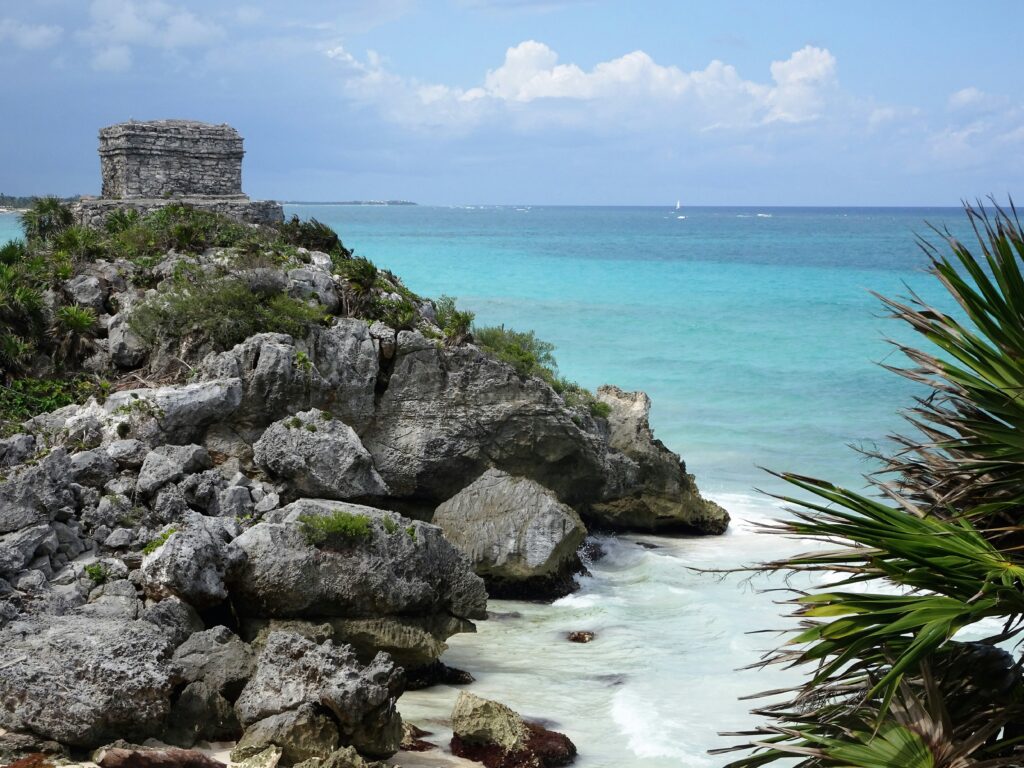
Just like Cancún, Riviera Maya beach towns shine in the winter. The sun is out, humidity is low and the turquoise beaches are sargassum-free. Winter is perfect for soaking up the sun and indulging in all the usual beach activities.
Personally, I only visit the Riviera Maya during the winter months. It’s the best time to explore extraordinary Mayan ruins like Cobá, and the Tulum Archaeological Zone, without wilting in scorching heat.
Expect Tulum to be as boho chic as ever in winter. The city hosts several wellness retreats and dance festivals in winter, including the Zamna Festival and Day Zero electronic music festival in January. You can also catch the Tulum World Environment Film Festival happening in town.
In Playa del Carmen, keep an eye out for holiday deals on tickets to the Xcaret Parks – Xcaret, Xplor and Xel-Ha. For New Year’s Eve, ring in the holiday with Playa del Carmen’s locals, who traditionally gather on the beach to watch the sunrise. After they’ve been celebrating and watching fireworks on the beach all night!
Cozumel
Average winter temperature
☀️ 70° – 82° F | 21 – 28° C
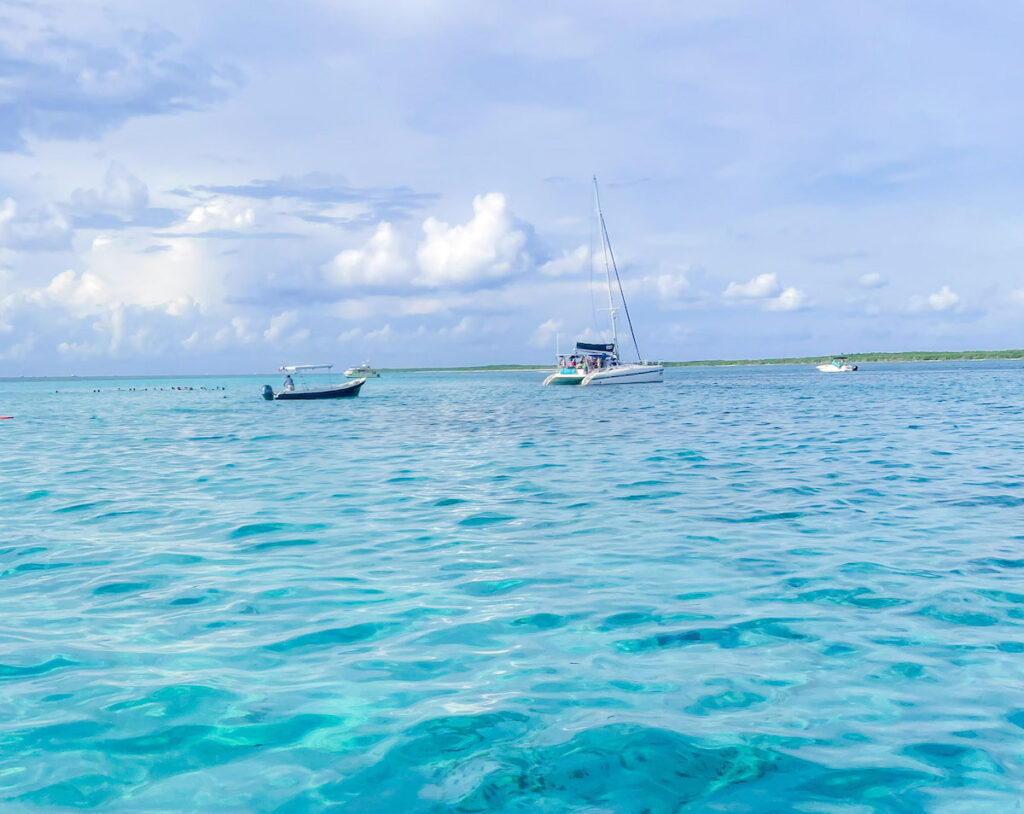
Cozumel is one of my favorite Caribbean destinations, and you’ll find me singing its praises all over this blog. The island is all about good vibes, great food, friendly locals, and Mexico’s best snorkeling and diving.
For underwater adventure in Mexico, nothing competes with the azure waters surrounding Cozumel. The Caribbean is teeming with marine wildlife that lives along the Mesoamerican Barrier Reef, the 2nd largest barrier reef in the world. Also called the Great Mayan Reef, it’s home to a remarkable ecosystem of over 500 species of fish and 70 types of coral. The reef stretches from just north of Yucatán and along the entire southeast portion of Mexico. It’s a spectacular natural wonder you can explore all winter long.
If you’re spending a tropical Christmas in Cozumel, you’ll experience Las Posadas, a holiday tradition performed all over Mexico. For the 2 weeks leading up to Christmas, locals walk from house to house emulating Mary and Joseph’s biblical search for shelter. Although modern-day participants are really seeking fiestas! In Cozumel, children carry out the tradition, caroling as they go door-to-door.
Cabo San Lucas
Average winter temperature
☀️ 55° – 75° F | 13 – 24° C
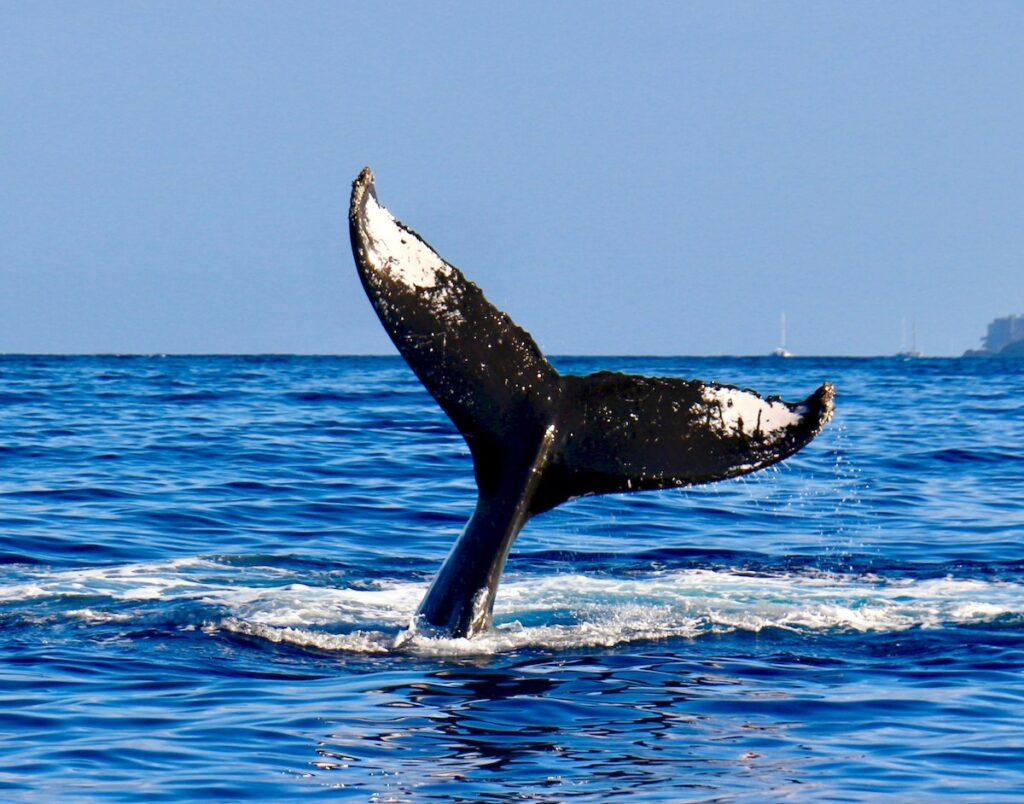
Winter in Mexico brings a miracle of Mother Nature to the country’s Pacific shores. From December through April, you can see the migration of thousands of humpback whales all along the Pacific coastline.
The luxury resort town of Cabo San Lucas is an ideal place to observe this phenomenon. Uniquely situated where the Pacific Ocean intersects with the Sea of Cortez, Cabo is literally the best place on earth to see breaching humpbacks, along with about 10 other species of whales. If you’re in Cabo during this time, a whale watching tour should be at the top of your to-do list!
In November, you can catch the Los Cabos International Film Festival, which promises a whirlwind of screenings and events.
You can count on warm, dry weather all season long. Perfect conditions for roaming around Cabo’s historic center, or taking a boat ride out to the iconic rocks of El Arco.
Puerto Vallarta
Average winter temperature
☀️ 60° – 80° F | 16° – 27° C
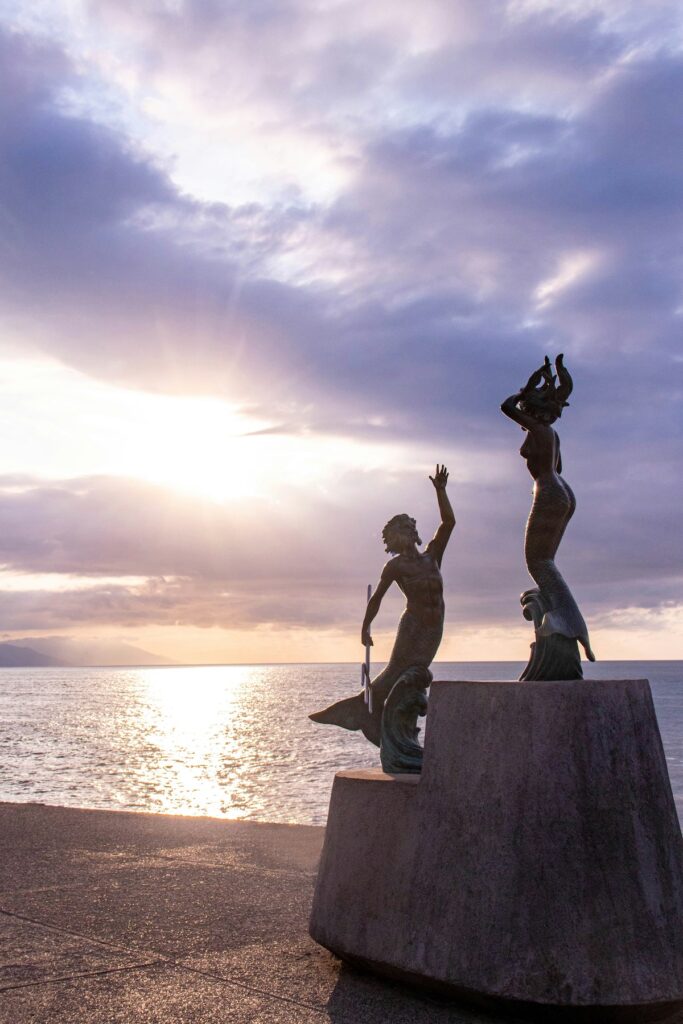
Puerto Vallarta is another legendary Mexico beach town with warm winter temperatures that are hard to beat. Outdoor activities like beach-going, zip-lining through the jungle and strolling the Malecón are front and center. You’re also very likely to spot whales here, too.
Puerto Vallarta is one of Mexico’s top food cities, a truth hammered home every November with the Festival Gourmet International. One of Mexico’s most anticipated food and wine events, this 10-day festival spotlights several top, local restaurants and celebrated Mexican chefs.
During the same month, beer enthusiasts won’t want to miss the Brewmasters Craft Beer Festival. Much more laid-back than than the Festival Gourmet, Brewmaster’s features live music, craft beer tastings and a hefty helping of food vendors working their magic down at the beach.
In early November, prepare to meet Puerto Vallarta’s iconic Calavera Catrina. According to the Guiness Book of World Records, it’s the tallest catrina in the world. Puerto Vallarta’s statue of this elegant, female skeleton, an icon of Dia de los Muertos (Day of the Dead), stands near the boardwalk at 92-feet tall!
Mazatlán
Average winter temperature
☀️ 60° – 80° F | 16 – 27° C
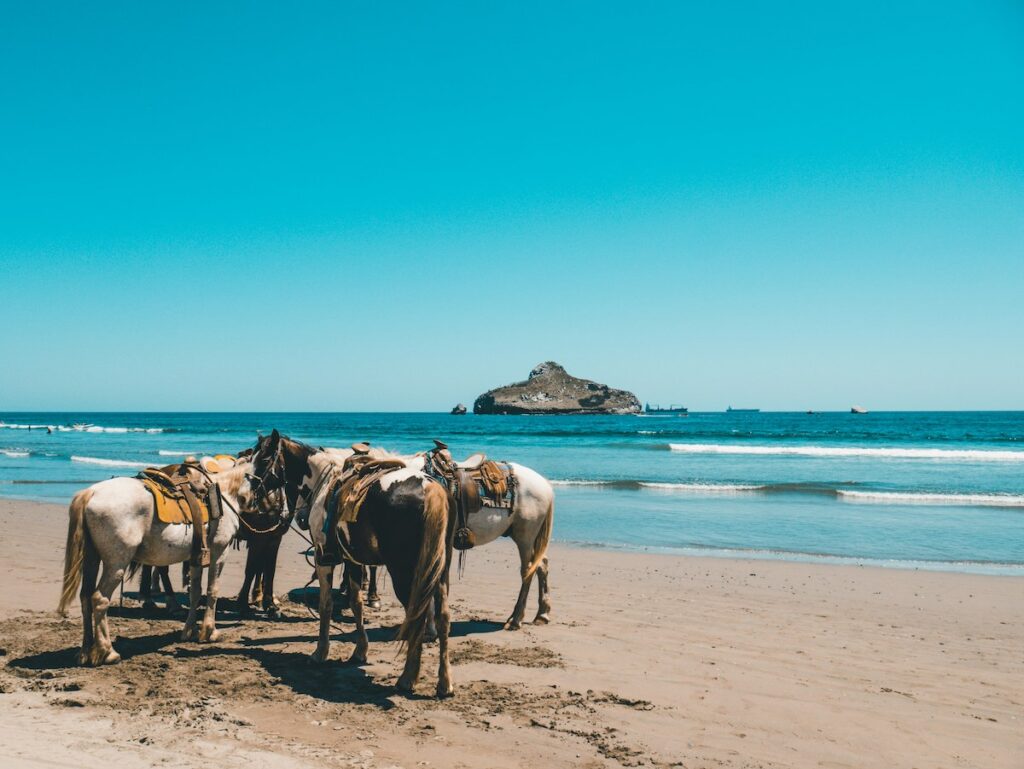
Touted as the “Pearl of the Pacific,” Mazatlán is an awesome winter in Mexico destination. The Zona Dorada, or Golden Zone, is bustling with restaurants and hotels that are anchored by beautiful beaches. Fabulous weather makes it a great time to explore outdoors, be it strolling Mazatlán’s pretty, colonial center, or hitting the beach to surf, sail, drive ATVs, or ride horses.
Winter is also when Mazatlán hosts one of the biggest parties of the year — the 3rd largest Carnaval celebration in the world after Rio de Janeiro and New Orleans. Who knew!
Carnaval, which is spelled with an “a” instead of an “i” in Spanish, kicks off in late January over the 6 days leading up to Lent. It’s a family-friendly affair featuring incredible celebrations along the Malecón. Expect a street party like no other. Raucous parades, endless dancing, spectacular concerts with local and national acts, theatrical performances, amazing fireworks displays, incredible food, and even effigy burning!
Todos Santos
Average winter temperature
☀️ 55 – 75° F | 13 – 24° C

Searching for a Pacific Beach town that’s more laid back and less touristy than others on this list? Say hola to Todos Santos.
Once a popular day trip from Cabo, Todos Santos is a designated pueblo magico that’s become a destination in its own right. With its boho vibes, foodie scene, boutique shopping, art galleries, and dramatic natural beauty, Todos Santos is a top, under-the-radar winter escape.
Surfing is one of the top things to do in Todos Santos, with its beautiful, sprawling beaches less crowded than others in Baja. Hiking is another top pastime. Punta Lobos trail is especially popular. It offers striking views of the ocean and cliffs, as well as ruins of the old port and sugar mill.
Like other destinations on Mexico’s Pacific, you’re practically guaranteed to spot a whale or two while you’re here. For a more hands-on, animal kingdom experience, join the non-profit organization Tortuguero Las Playitas to release freshly-hatched sea turtles into the ocean. From December through March, locals gather on the beach at sunset for hatching events that protect the turtles from being hunted.
January in Todos Santos brings the annual Tropic of Cancer Music & Arts Festival, which features local and international acts. Buy your tickets in advance because it always sells out!
Bacalar
Average daily temperature
☀️ 68 F – 86 F | 20° C to 30° C
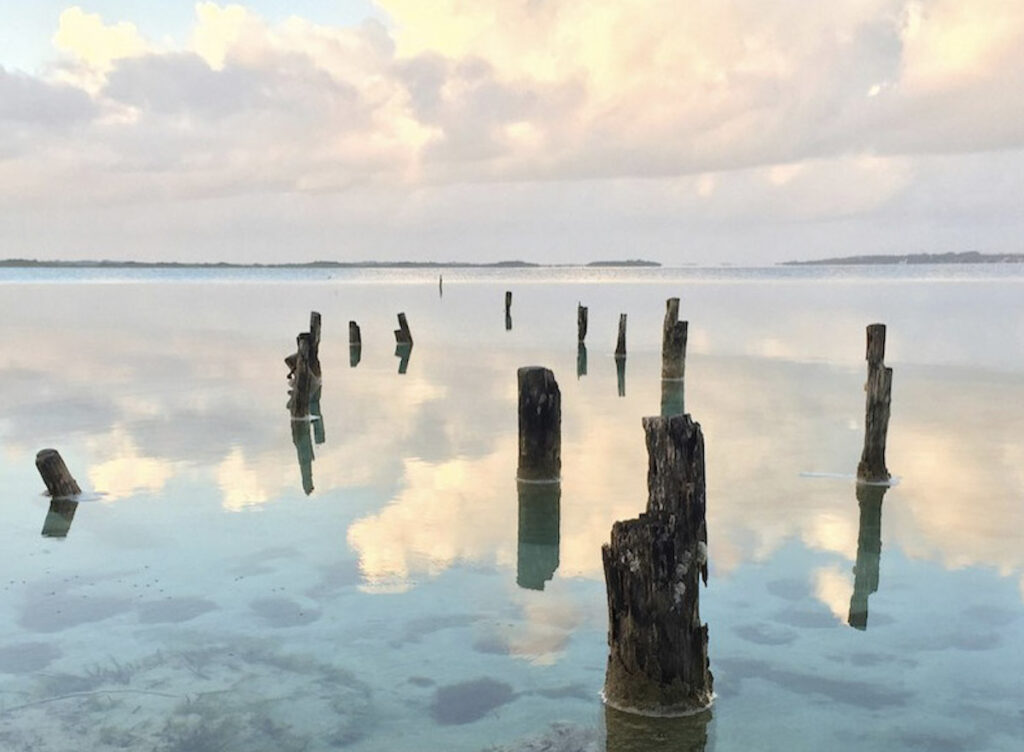
Bacalar is one of those places that’s almost too beautiful to put into words. While Bacalar isn’t technically a beach town, sunning on the shores of the “Lake of Seven Colors,” as it’s also known, is as brilliant a winter escape in Mexico as you can get. Being way less touristy than Quintana Roo resort towns, Bacalar is where you come to escape amid natural beauty.
Like other Quintana Roo destinations on this list, winter sees Bacalar is at its driest and least humid. Daytime temps are sunny perfection, so you can play on the shimmery lake for hours. Booking a boat tour is a must to appreciate the lake’s immense beauty. For some seriously fun water play in the area, head 20 minutes south to Los Rapidos. It’s a long, lazy river where you can spend the day gleefully floating along the currents.
Winter in Bacalar is also an optimal time to explore Mayan ruins further afield. The closest are Kohunlich, a large Mayan archaeological site dappled with pyramids, and Dzibanché, a majestic field of ruins dating back to 300 BCE.
I’ll be wintering myself in Bacalar in a few weeks. Cannot wait! Stay tuned for all my awesome insider tops on the best Bacalar spots to eat, stay and play.
Winter in Mexico Inland Destinations
Mexico City
Average daily temperature
☀️ 45° – 70°F | 7° – 21° C
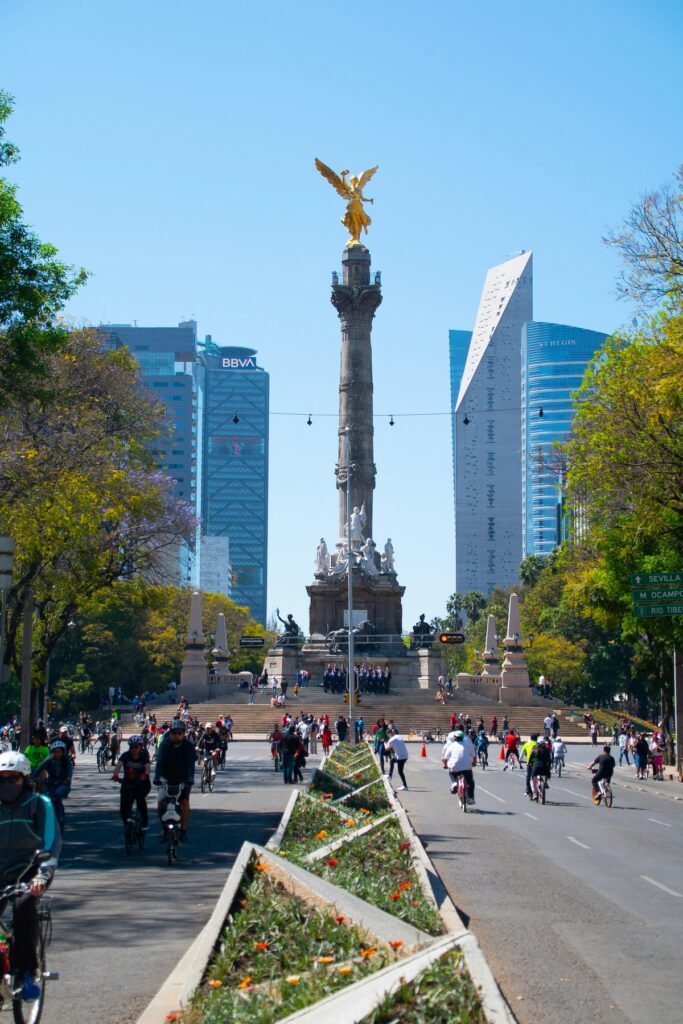
Mexico City is a wonderful winter destination. Not only can you get away with wearing jeans and a T-shirt thanks to mild daytime temps, but winter also promises visitors a flurry of epic fiestas and local traditions.
In the days leading up to Dia de los Muertos (Day of the Dead) on November 2nd, vibrant celebrations honoring the dead take over the city. Expect huge and colorful parades, along with a variety of concerts and pageantry in El Zócalo, along Paseo de la Reforma, and in several parks across the city.
Beautiful lights and displays bejewel Mexico City at Christmas time, especially in El Zócalo and much of Paseo de la Reforma, which is adorned with poinsettias and nativity scenes. Thousands of people from around the world pilgrimage to Mexico City to celebrate the legendary Virgin of Guadalupe on December 12th, which is also when you’ll start seeing festive Las Posadas processions. Also in full swing is Navidalia, a spectacular annual festival of lights, foods and activities, including an ice skating rink!
Once again, it’s El Zócalo for the win on New Year’s Eve. Mexico City’s Historic Center comes alive with concerts, dancing, an incredible variety of food, and an amazing fireworks display.
As a global culinary destination, the DF is one of the best places to try traditional Mexican holiday dishes. While many traditional Mexican foods aren’t vegan or veggie friendly, you can definitely still wrap your taste buds around a few. Veggie and even vegan tamales are easy enough to find at restaurants around the city, as is Romeritos, a holiday dish of greens cooked in a mole sauce.
Buñuelos are a fried donut served around Christmas and New Years. Wash these doughy goodness down with Ponche Navideño, a hot and spiced apple cider type drink made with fruit, sugar cane, cinnamon, and piloncillo. It’ll warm you up while you’re out shopping Mexico City’s Christmas markets!
Oaxaca
Average winter temperature
☀️ 40° – 75° F | 4° – 24° C
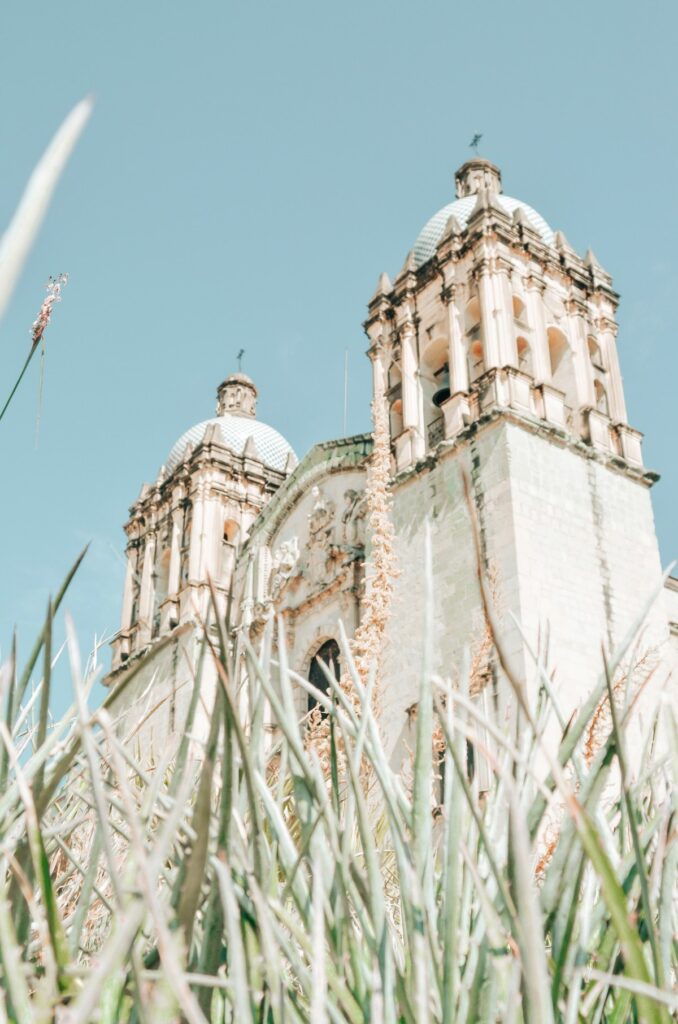
Stateside, we carve Halloween pumpkins. In Oaxaca, they carve Christmas radishes.
Noche de Rábanos (Night of the Radishes) began as a gimmick aimed at drawing people to Oaxaca’s dwindling Christmas markets. Today, it’s a proud, 100-year old tradition that takes place every December 23rd. Join locals for this unmissable holiday event, when dozens of radish artists compete for prizes, and hundreds of Oaxacans flood the city’s main square to marvel at their impressive creations. You’ll see everything from root veggies fashioned into elaborate nativity scenes to honorific representations of ancient Zapotec civilization.
Oaxaca is a foodie paradise, and winter’s cooler temperatures make it an excellent time to indulge in some of the region’s heartier foods. Tamales are a staple of Mexican cooking in winter, but tamales Oaxaqueños contain one very special ingredient – Oaxaca’s deliciously famous mole negro. Traditionally, tamales Oaxaqueños contain chicken, but you can also find veggie versions stuffed with potatoes, chiles or onion.
And you definitely have to try champurrado, a favorite holiday drink that accompanies tamales in the cooler months. This thick, hot chocolate-type drink made with milk and masa is rooted in ancient Aztec and Mayan traditions.
San Miguel de Allende
Average winter temperature
☀️ 40° – 75° F | 4 – 24° C
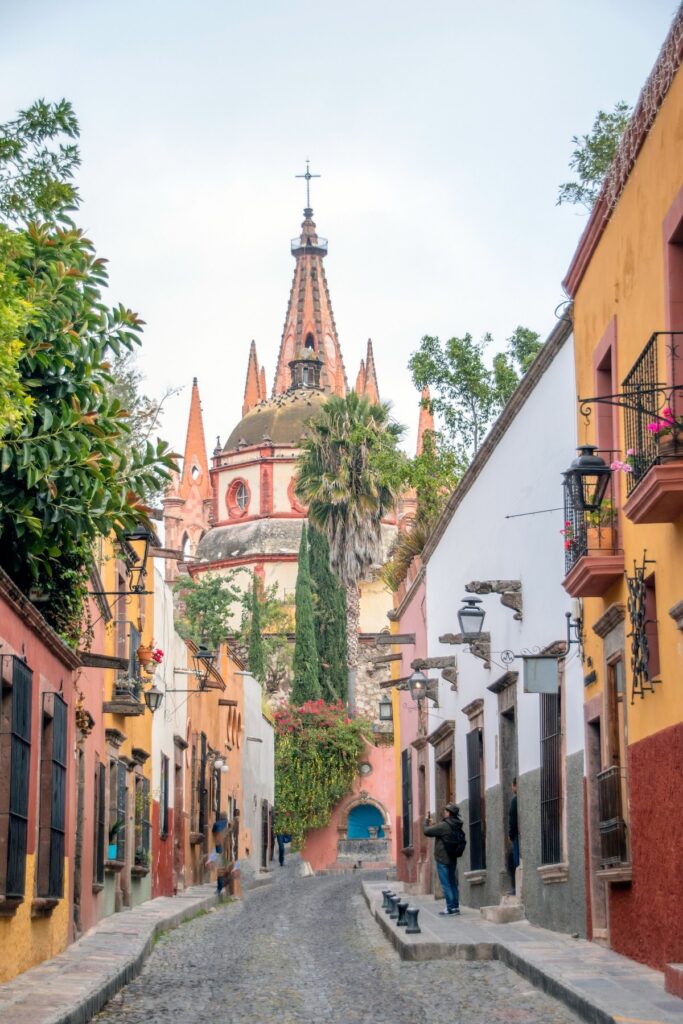
Every November 2nd, the lovely colonial town of San Miguel de Allende hosts one of Mexico’s biggest Day of the Dead celebrations. Hundreds of locals dressed in full catrina and calavera regalia take over the city’s cobblestones streets, which are flooded with orange and yellow marigolds, the holiday’s traditional flower. In Plaza Principal, you’ll encounter colorful altars honoring the dead, along with lively music and dancing. Ask a local for tips on where to find the best pan de muerto, a traditional sweet bread Mexicans eat to honor the dead at this time.
At Christmastime, San Miguel de Allende is awash in gorgeous decorations, with parades, concerts and traditional performances lighting up the town. Also arriving in December is the Festival de Cine, which honors international independent films, shorts and documentaries. And if you’re looking for a unique way to warm up during the cooler months, you can renew recharge at San Miguel’s famous hot springs.
Puebla
Average winter temperature
☀️ 40° – 70° F | 4 – 21° C
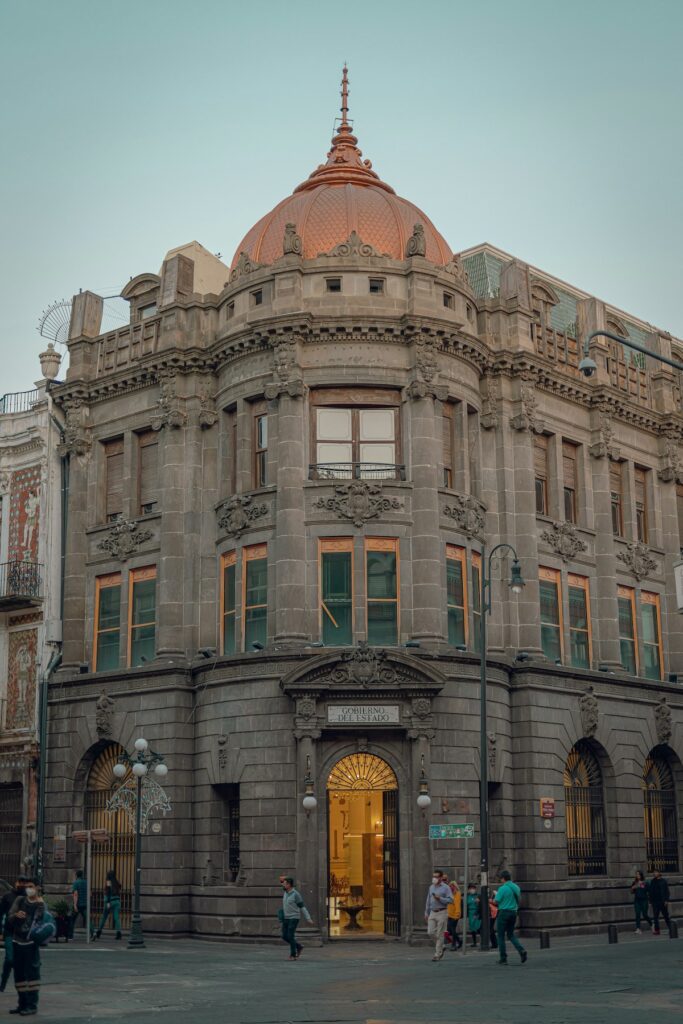
The historic city of Puebla is a delicious destination to eat your way through in the winter. A major part of Mexico’s holiday culture is celebrating with sweets, and Puebla produces a mouthwatering variety – over 300 different kinds of dulces tipicos (typical sweets). Want to get fired by your dentist? You’ll find all the best candy shops on 6th Avenue, which the locals Calle de los Dulces, or Sweet Street!
If you’re feeling festive, head to Puebla’s most famous cantina, La Pasita, for Mexico’s version of eggnog, called rompope. An egg-based liqueur concocted with either rum or brandy that’s topped by a dusting of cinnamon, rompope is allegedly the invention of Poblano nuns.
No visit to Puebla is complete without indulging in the divine, Mexico culinary classic known as mole Poblano. Mexico produces over 50 types of mole, with each containing an army of ingredients. But it’s the variation of less chocolate and more raisins that makes mole Poblano distinctly sweeter and less spicy than the equally outstanding mole negro from Oaxaca. Puebla’s convents must be dedicated to the food gods, because, like rompope, mole Poblano owes its invention to Puebla’s palate-savvy nuns.
If you happen to be Christmas or souvenir shopping in Puebla, pick up some artisanal Talavera pottery. It’s emblamatic of the region and makes an excellent gift!
Mérida
Average winter temperature
☀️ 60° – 85° F | 16 – 29° C
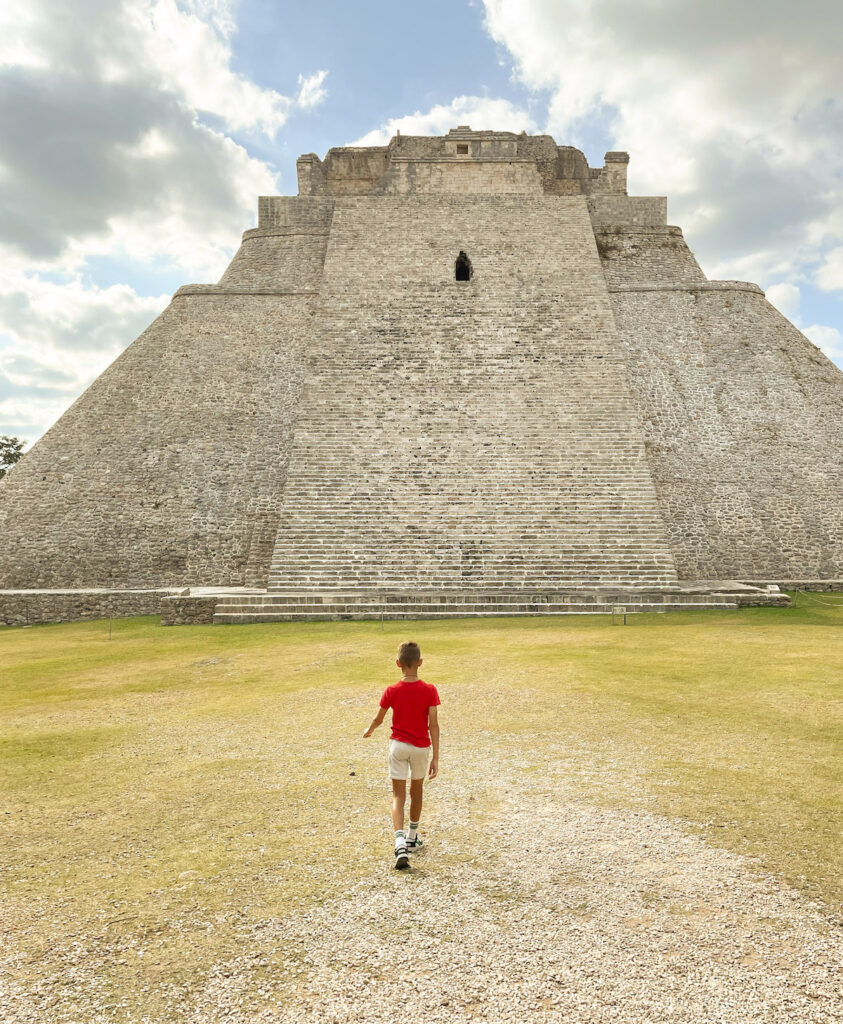
I’ve lived in Mérida for nearly 3 years, so I can vouch for winter being an excellent time to visit. The sun is out, minus the oppressive humidity, which is perfect for exploring Mérida’s historic center, its sublime Mayan ruins like Uxmal, and the area’s beautiful haciendas. It’s a touch too chilly to visit underground cenotes, but dipping in open pools warmed by the sun is fine.
One of the highlights of winter in the area surrounding Mérida is witnessing the magnificent migration of thousands of flamingos. Celestún, about an hour from here, is the most popular place for pink bird watching. But from October through February you’ll spot flamingoes everywhere along Yucatán’s coast. I live about 15 minutes from the beach town of Progreso, where I always see droves of flamingos gathered in the lagoons just off the highway.
Merida also throws some awesome winter festivals. In November, the Festival de las Ánimas (Festival of Souls) is a weeklong celebration for Hanal Pixán, which is the Mayan version of Day of the Dead. Festivities encompass everything from parades to musical performances, and even guided cemetery visits.
Mérida’s biggest annual celebration is Mérida Fest, a 3-week extravaganza celebrating the founding of the city every January. (As I write this, Merida is 484 years old). Hundreds of local and international artists and performers converge on dozens of venues across the city. You can catch concerts, theater and dance performances, visual arts displays, culinary offerings, and so much more!
Valle de Bravo
Average winter temperature
☀️ 40° – 75° F | 4 – 24° C
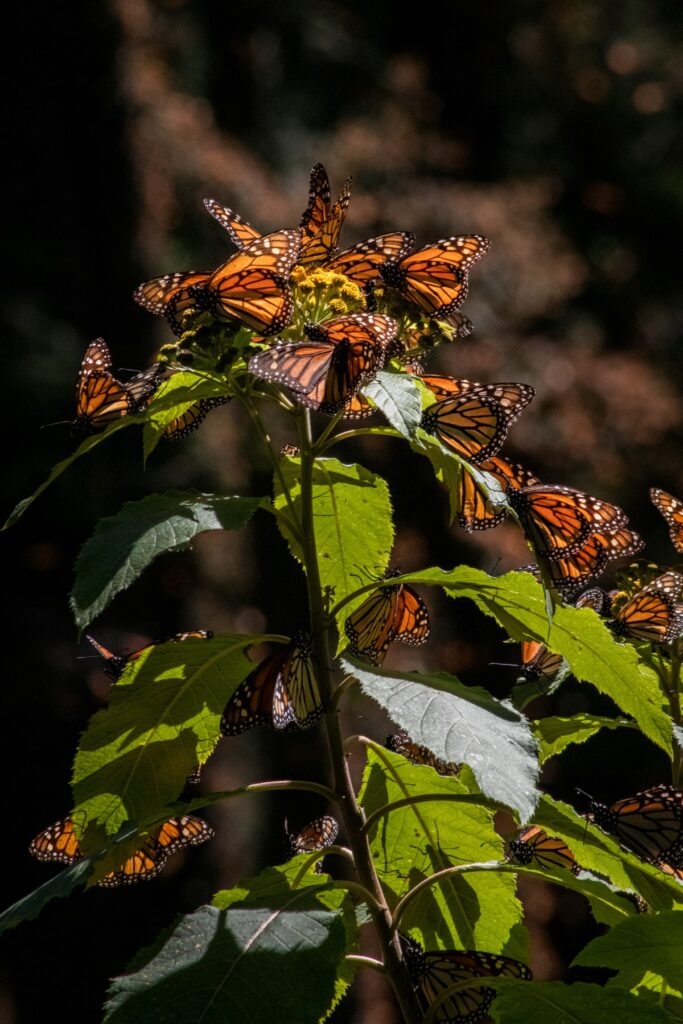
Sunny and dry days make the picturesque Valle de Bravo an outstanding winter getaway. A delightful colonial town on the edge of Lake Avándaro that’s ringed by dramatic mountain ranges, Valle de Bravo is the perfect choice for nature lovers and adventure enthusiasts. Hiking, biking, horseback riding, paragliding, boating, and kayaking are just a handful of activities that this pueblo magico offers.
All winter long, from October to March, you can witness the miraculous phenomenon of tens of thousands of Monarch butterflies migrating in the area. Several federal butterfly reserves are within driving distance of Valle de Bravo, but the closest is Piedra Herrada, only a half hour away. You can marvel at the butterflies while hiking the sanctuary’s trails, or you can explore Piedra Herrada on horseback.
Valle de Bravo is just 2 hours from Mexico City, in Mexico State. As you can imagine, its wealth of activities and serene beauty make it a popular weekend and holiday getaway for Mexico City’s locals. If you plan to visit in winter, I highly recommend booking well in advance.
San Cristóbal de las Casas
Average winter temperature
☀️ 40 – 70° F | 4 – 21° C
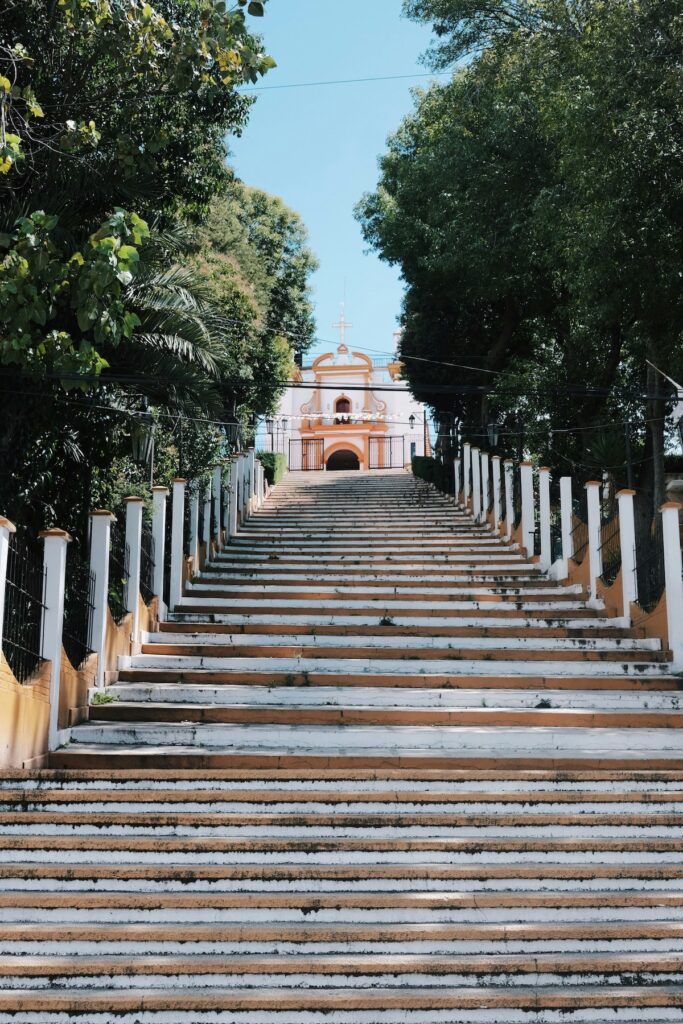
Ensconced 6,900 feet above sea level in the mountainous highlands of Chiapas, San Cristóbal de las Casas is one of those scenic towns that’s quickly rising in the ranks of must-see Mexico destinations.
Considered the cultural capital of Chiapas (it was the actual state capital until 1892), San Cristóbal boasts a vibrant music and arts scene, as well as a rich textile and ceramics tradition that’s rooted in its indigenous Tzotzil and Tzeltal population. You’ll find striking and authentic textiles and ceramics to purchase at the Mercado de la Caridad y Santo Domingo, and in smaller shops around town.
San Cristóbal is also an ideal base for day trips to the area’s surrounding natural wonders. Sumiduro Canyon, the surreal turquoise pools at El Chiflon Waterfalls and Agua Azul are all breathtaking. A visit to the Arcotete Caves is also in order. You can scamper through the limestone caves and ride horses, or go for more high-octane adventures, like rock-climbing and zip-lining above the forest.
Copper Canyon (Barrancas del Cobre)
❄️ Average winter temperature
30 – 65° F | -1 – 18° C

Photo credit: Alejandro Cartejena.
A breathtaking natural wonder, Copper Canyon, or Barrancas del Cobre in Spanish, is a series of 6 colossal canyons situated in the Sierra Madre Occidental Mountain Range in the state of Chihuahua.
For perspective, Copper Canyon is 4 times the size of the Grand Canyon, although it’s narrower, deeper and richer in greenery. Winters in Copper Canyon can get frosty, with snow common at higher altitudes between November and March.
The most popular way to explore Copper Canyon is to take the Ferrocarril Chihuahua al Pacifico, commonly known as the El Chepe Express, which runs the entirety of the main canyon. First class tickets promise luxury service. You’ll be treated to a designated dining car, reclining seats, panoramic windows, and premium bar service.
It takes roughly 15 hours to reach the peak of the canyon after boarding the train at Los Mochis on the coast in Sinaloa. You can alight the train to visit and stay overnight in some of the towns along the railway, like Urique, Divisadero and Creel.
Hiking, mountain climbing, mountain biking, horseback riding, visiting hot springs, and taking nature tours are the most popular activities in Copper Canyon. You’ll also meet the Tarahumarans, Copper Canyon’s proud, indigenous inhabitants. You can support their self-sustained community by purchasing the food and crafts they sell along the railway.
The Wrap
If you were on the fence about where to spend winter in Mexico, I hope this article helps you pick the perfect destination. Mexico truly offers something for everyone all year long. But with so many festivities, events and sunny cities to counter chilly winters back home, you really can’t go wrong snowbirding anywhere in south of the border.
To discover more fabulous Mexico destinations, check out my Unrivaled Guide to El Cuyo and The Ultimate 10-Day Yucatan Peninsula Itinerary.
As always, inspired travels Amigas! 💜
FYI – The World I Roam contains affiliate links. When you make purchases through these links, you support this site at no additional cost to you. Thanks for the love! ❤️


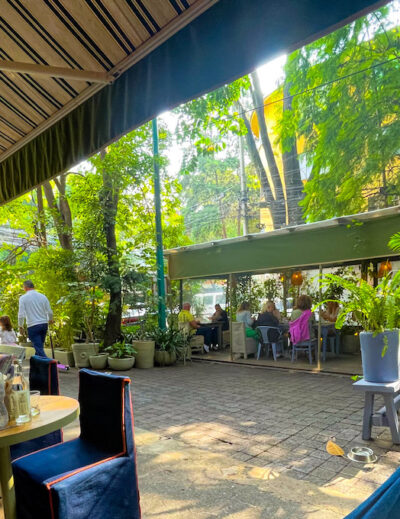
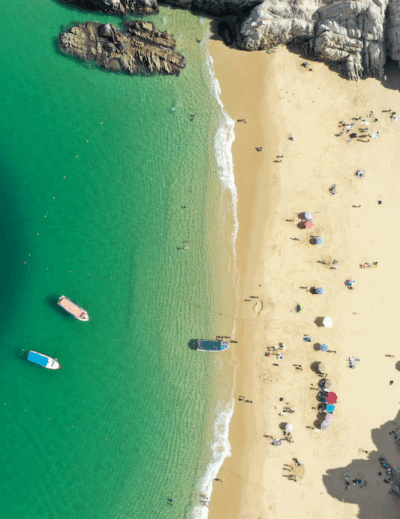

Leave a Reply